June, 2017
We all have special needs with lactose intolerance I can have no milk in my coffee; with mysophobia you find a dusty office unbearable; people suffering from severe hay fever find fragrances repellent......Better understanding springs more tolerance which leads our way to a happier and fairer inclusive society.
 Quite a number of HKRSS students are admitted to universities in Taiwan every year. With recommendation from the school, all ten applicants succeed in securing an offer before the beginning of HKDSE this year.
Quite a number of HKRSS students are admitted to universities in Taiwan every year. With recommendation from the school, all ten applicants succeed in securing an offer before the beginning of HKDSE this year.
One of the boys has autistic disorder and the other has mild intellectual disability. The twins are dyslexic and get anxious easily.
Their classroom dynamics probe a lot of questions why does the school put students with autistic disorder, intellectual disability, and dyslexia together in one class? Why does the vice headmaster compliment the girls who don't pay full attention to their teacher? This cannot be a regular mainstream school......
HKRSS Tai Po Secondary School has a long story. Lest others misunderstand the ideals of the school, Franky Poon makes a big effort trying to explain them, sometimes in a jocular way. But on the other hand, he supplements his explanation with firm conviction, "This mode of education may not be up everyone's alley. Some eventually understand, but others don't; either way, we are determined and committed to pursue this path."
The long story begins in Form 1.
While most schools screen their student applicants, HKRSS looks at their parents. Some parents, for example, like to start the interview with a prompt question on the school's university admission rate. Franky Poon usually takes a quick look at the student's report card from primary school and questions back, "Does it matter to your son?" Parents who can make sense out of such attitude can go through, those who cannot will leave.
The school accepts approximately thirty students via central allocation and around twenty door-knocking students every year. "We have three classes in each grade and can admit ninety students at most. But integrated education is only possible with small classes, meaning we must maintain the current scale of the school." No child left behind for real? Franky Poon assures, "We welcome any students, including any students carrying any labels. We are oblivious to labels."
The inclusive admission policy explains why SEN students account for more than half of the school's population. Among a total of over two hundred students, there are children diagnosed with intellectual disability, autistic disorder, hyperactivity disorder, dyslexia, or even giftedness and many of them wear more than one label.
Franky Poon explains, "We do not intend to offer special education, but aim to support every single child. Every child is unique and we focus on managing the individual differences, instead of making SEN the byword of the day."
Many door-knocking parents are huge fans of HKRSS. They have started attending talks at HKRSS back when their children were still in primary schools. As Franky Poon says, "We have known each other for a long time." Before school commences, HKRSS has already gathered a pile of "certificates", consisted of all the assessment reports since the age of five, of every student to supplement a detailed interview with the parents. With full information, teachers can then prepare a "natal chart" for every student to decide their future school life.
"We are like face readers. We make our class allocation decisions based on everything we can possibly get, ranging from personality, ability, temperament to any other traits." For examples, a whiny student makes a good match with a student with language disorder; a boy who has endured the absence of a loving father is assigned to the class of a male teacher; a boys-only class is ideal for a boy who likes physical contact. The allocation, once made, stays the same throughout the next six years.
At a previous orientation camp, a student and a teacher were found to have "personality clashes" and actually ran into a bit of a clash. Franky Poon decided to move the needle by moving the teacher, but not the student. "That class teacher was known for his conscientiousness but the student took it pretty hard. We had a chat with that teacher. Although we did think of moving the student to another class, we still found the reallocation of teachers more appropriate, so we assigned another teacher to the class."
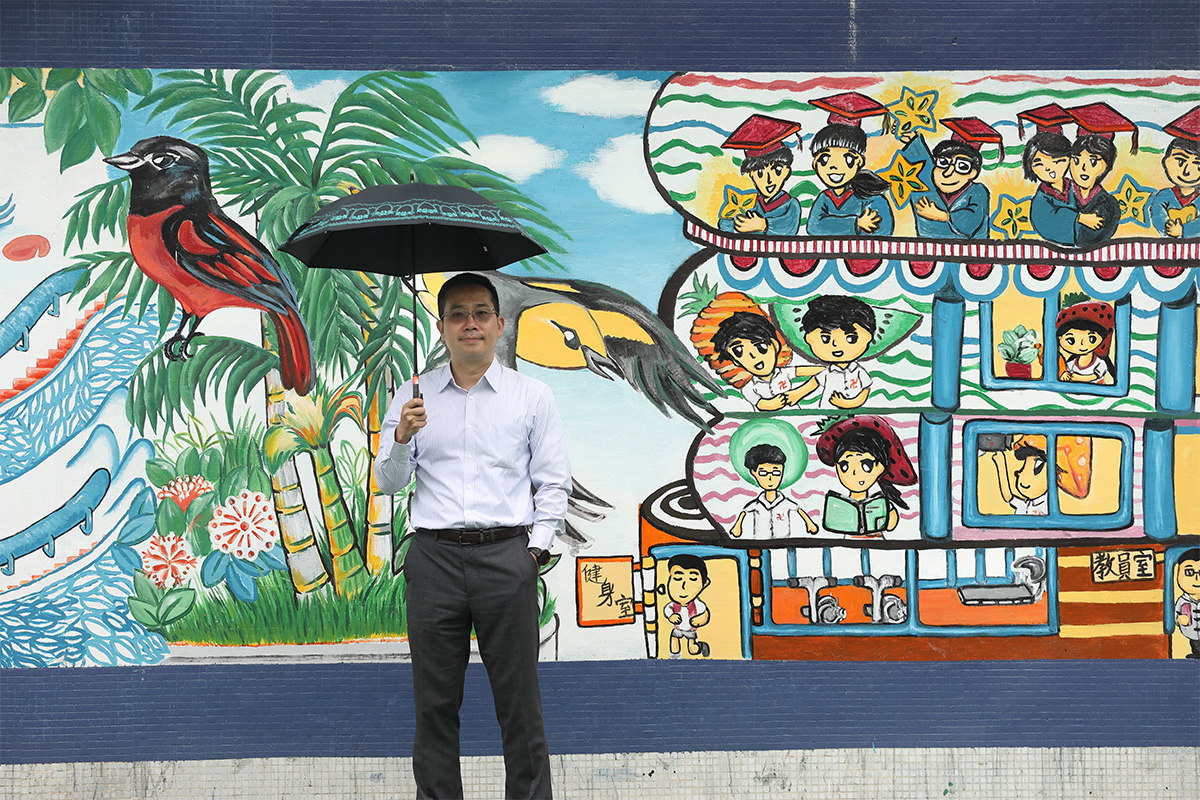 The massive wall painting behind Franky Poon is painted by a group of students led by a last year's graduate. She is now studying fine arts in Taiwan.
The massive wall painting behind Franky Poon is painted by a group of students led by a last year's graduate. She is now studying fine arts in Taiwan.
All classes are set. Hopefully, teachers and students can have six years of happiness and harmony together.
Given the huge differences between students, how to manage a class? "Speaking of labels, can you recall how we were categorised when we were small? The goody or naughty, the beaver or slug, the smarty or dummy! These labels have been around for centuries and there must be certain wisdom in them, that is, they are not set in stone and can be changed the lazy ones can catch up and the less talented ones may get their minds straightened out one day."
However, the most common labels in the current education field autism, hyperactivity disorder, dyslexia, intelligence quotient (IQ) are tags of a lifetime. "These medical labels are daunting. They define a child and become his or her everything. Scoring 59 in an IQ test defines your intelligence for the rest of your life. In fact, someone with an IQ of 79 is not necessarily smarter than someone with an IQ of 59." More importantly, these medical tags are no flawless science and may have their faults. "The biggest crisis in our education is that teachers accuse students with labels as problematic and hand them over to doctors without feeling the need to review their pedagogy."
He even comes up with an IQ question, "For example, this is an English lesson and I am going to teach present continuous tense. There is a student with autistic disorder, one with dyslexia, and another with hyperactivity disorder. Will you design three different sets of teaching materials for them?"
He asserts, "Medical labels are of no use to educational decisions and are no guide to teaching practice." Teaching only concerns with how fast and how much students can understand, in addition to its modes of presentation. "For instance, more videos should be used to help any children who are more receptive to visual presentations. It does not matter whether they have autistic or hyperactivity disorder."
Mathematics class sets another example. Students who are quicker in assimilation are given fifteen questions arranged in an order that starts with the easiest and ends with the hardest; students who are slower tackle ten questions of similar level. "Each of our school subjects is divided into three levels core, extension, and challenging suitable for weak, intermediate, and strong students respectively. All students should be allowed to learn at their own paces and not everyone should do the same exercise or take the same examination."
In the school's study room, around ten DSE candidates are preparing for the upcoming exams and some of them are having a nice chat with Franky Poon. Many of his students have applied for extra time allowance. Franky Poon plays it down, "Those who are identified as SEN students can apply for extra time allowance. As I said, do not play up medical labels. They are only useful in times of application for government funding."
According to the regulation, the school is entitled to a government subsidy of ten to twenty thousand dollars for every SEN student. The government, if truth be told, allocates grants based on labels. The amount of students HKRSS has admitted is supposed to entitle them to a subsidy of $2.7 million, except for the fact that the government also "imposes a ceiling at $1.5 million per school per annum." He pulls no punches, "Look, the government is actually punishing schools that are willing to offer integrated education. The government encourages us to accept more SEN students under the banner of flexible sharing of resources, but the irony is how are five lunches possibly enough for ten people?"
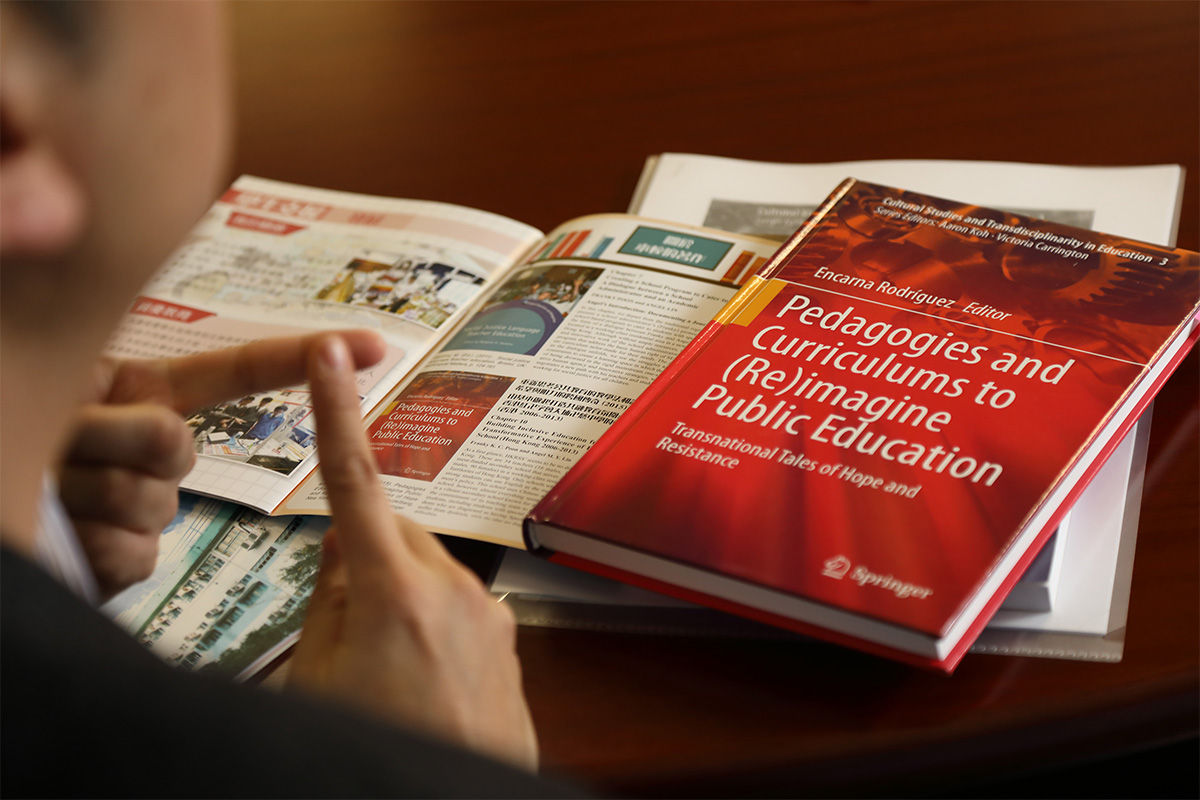 To reform HKRSS, Franky Poon went to Canada for a trip of class observation. He brings back new ideas and pedagogies of integrated education and shares his experience in books and brochures.
To reform HKRSS, Franky Poon went to Canada for a trip of class observation. He brings back new ideas and pedagogies of integrated education and shares his experience in books and brochures.
So, is this a mainstream school or a special school? Franky Poon answers, "We are publicly-funded, we do not turn away any students for their labels, and we put the ideal of integrated education into practice. If we are considered a special school, Confucius must have been the founding father of special education!"
In other words, how have schools that only welcome top students become normality and, eventually, the mainstream?
According to Franky Poon, the story of the twin sisters is only one of the many beautiful examples that occur frequently in HKRSS. "Friendship is plain and simple to children. An autistic student and a gifted student can be friends simply because they both love to play video games." He is particularly impressed by the students' empathy for others. They never overreact to anyone for being themselves. "True integration is when you are not taken back by the sight of a wheelchair user shopping in a shopping mall. Our society is home to all types of people. We, each with our own goals and paces, all live together."
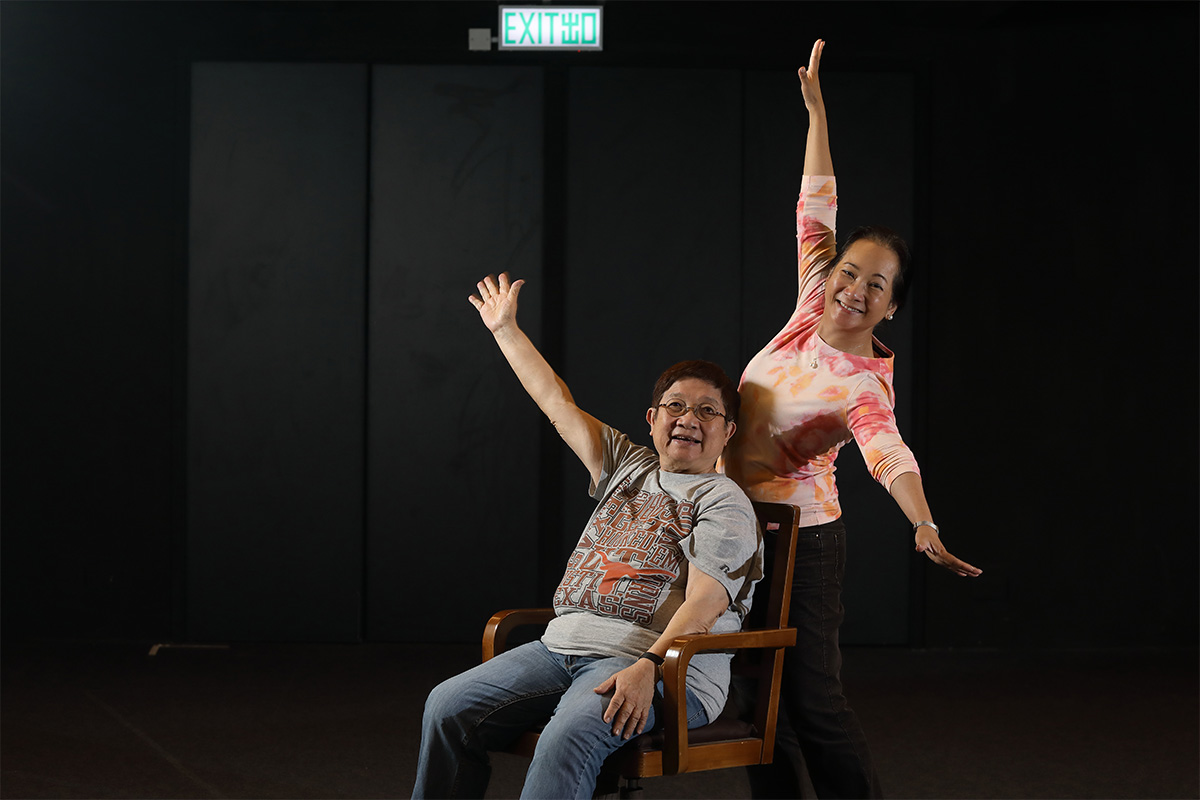 The respectable engines behind the experimental performances of AFTEC's Relaxed Theatre: Dr. Vicki Ooi, Artist Director (left), and Lynn Yau, CEO (right)
The respectable engines behind the experimental performances of AFTEC's Relaxed Theatre: Dr. Vicki Ooi, Artist Director (left), and Lynn Yau, CEO (right)
Dr. Vicki Ooi first heard of relaxed theatre in Britain in 2011 when a friend told her about the "relaxed" performances especially adapted for autistic children. "I was very curious at that time how could autism and theatre possibly come together?"
Her doubt, to no surprise, is shared by many parents of autistic children. Flashy lighting, dazzling sound effects and other sensory stimulations are probably too overwhelming for children; keep quiet in the designated seat is the most basic rule of theatre etiquette and any indiscreet reactions are deemed disturbances. Autism and theatre seem to be essentially incompatible. You may insist on bringing your children to the theatre, but be prepared for some eye-rolling or leaving midway.
A British mother finally brought up the elephant in the room after a few failed attempts. She wrote a letter to theatre companies in London's West End and called attention to the artistic needs of autistic patients, thus the birth of relaxed theatre.
AFTEC brought relaxed theatre to Hong Kong in 2014 and the Chinese name of the programme literally asks audience to "be themselves".
Lynn Yau, CEO (Planning and Arts Learning) of AFTEC, explains, "We relax the house rules because we want children to be themselves during the show. You don't have to sit still and wait for the interval anymore feel free to move around or stand up and leave the auditorium anytime. A "cool down area" outside of the auditorium has a few tables and chairs, as well as crayons and paper, for anyone who needs a downtime. You can return to the show whenever you feel ready. Performers, backstage crew and venue staff are informed of the nature of the show and no one regards these behaviours as disturbances."
These are only some of the many arrangements of AFTEC's relaxed theatre. A pre-show information pack, including an introduction to the theatre environment, the storyline, and photos of performers in costumes, is sent to the audience of school groups; the play is abridged to allow time for more interactive activities as well as for children with shorter attention span; the audience are invited to go up to the stage and touch the props after the show to enhance multi-sensory learning; lighting and sound effects are minimised; attendance is capped at half capacity of the auditorium to create a more accommodating environment.
The script and performance of Relaxed Theatre are adapted and interactive elements are included for autistic children to enjoy. The pictures show AFTEC's King Arthur in 2016. To save production cost, a special edition in relaxed theatre format was done in addition to the original stage production. Dr. Vicki Ooi points out that relaxed theatre cannot sustain in business model but such performances certainly deserve more resources and support. (Photos courtesy of interviewees)AFTEC has done a lot of research and preparation for this experiment, including consultation with professionals and class observation at special schools. "There are shows for the hard of seeing and hearing in Hong Kong. Those are more manageable because they do not affect the ordinary audience or require changes to the performance and presentation. Relaxed performances is a different story," explains Lynn Yau.
Dr. Vicki Ooi never considers relaxed theatre a reductive compromise. Despite the abridged script and less sensory stimulation, it can potentially develop into a new form of theatre. While not every script is suitable for relaxed theatre, a right pick can solicit more enthusiastic response than the ordinary audience and create an impressively synchronised dynamic between performances and spectators.
The reception is certainly a pleasant surprise to Dr. Ooi. Years of teaching experience with high-functioning autistic students have left her thinking that these students were less empathetic than others. For instance, a teacher who was not as cheerful as usual would be checked on by others but not autistic students. However, autistic theatregoers are so eager to cheer and applaud for the characters on stage and some even repeat the magic words loudly to save the lead from danger… Relaxed performance magnifies the tiny, intangible social cues on stage and, in so doing, evokes the empathy of autistic children.
With the aim to explore future possibilities of relaxed theatre, AFTEC has organised a conference and invited professionals of relevant disciplines to participate. Some suggested that a special performance could not serve the purpose of true integration and autistic patients should join an ordinary performance instead. Lynn Yau, in response, addressed the lack of audience education in Hong Kong and that Hong Kong still had a long way to go before reaching such an idealistic goal. What can be done, in reality, to help ordinary theatregoers understand that autistic children have no intention to disturb? How to make them understand that autistic children also have the right to appreciate theatre, just like all other children? "The United Nations Convention on the Rights of the Child confirms child's right to play. Theatre is precisely where they can take part in imaginative play."
Lynn Yau believes that inclusion is also about opening up options and room for different people. Theatres should also be able to serve this purpose. Relaxed theatre is therefore worth pursuing on the road to a genuinely inclusive society. Moreover, not only autistic children are benefited from relaxed performances, "We receive enquiries on whether the show welcomes autistic adults, because they have never set foot in a theatre before. Among the audience are children with other special needs and elderly patients with dementia." The concept of "relax and be yourself" blooms into a garden of true colours where everyone takes the liberty of expressing his/her own needs and this is another approach to integration.
Ko Mei Yee, a teacher of Hong Chi Winifred Mary Cheung Morninghope School, shares her thoughts on AFTEC's relaxed theatre after watching the show with her students
How did your students respond? Any particularly unforgettable moment?
We took students with mild and moderate intellectual disabilities, some of whom are also autistic, to the show and they were all very eager to participate. The staff members of AFTEC and the Sai Wan Ho Civic Centre were so friendly and talked to our students like equals, with acceptance and love.
I later invited my students to describe the story in one line and share their thoughts. They expressed how happy they were to laugh and shout out the "unlocking charm" together. They were also thrilled to have taken photos with performers and operated stage lighting during the backstage tour. Up until now, some students still ask about the leading performers and whether they will watch the show again. The show is an unforgettable experience for them.
What is theatre to our children, parents, and society?
Relaxed performances make the theatre accessible to children with intellectual disabilities, autism or other special needs. Theatre experience can be as delightful for them as it is for ordinary people. Parents can participate without fear for embarrassment or causing disturbance. Hong Kong does have special performances for SEN children, but only once in a long while. Besides, those are not parent-child friendly or suitable for moderately intellectually disabled people because their designs are not as well-thought-through and considerate as AFTEC's relaxed theatre. Once, I took my students to an ordinary drama and a venue crew took us away because of the noise we made.
If relaxed theatre becomes popular in our Hong Kong, more people will pay attention to the accessibility of arts to the disabled. I hope people with different abilities can also play a part in arts and culture, so that more aspects of our lives can embody equality and respect.
 Almost everyone in the office has some sweets ready for Wah-dee to motivate his hard work. "Photocopying a thousand copies of document doesn't mean anything to him. But he will have a sense of purpose when he can have a chocolate for photocopying until 5pm."
Almost everyone in the office has some sweets ready for Wah-dee to motivate his hard work. "Photocopying a thousand copies of document doesn't mean anything to him. But he will have a sense of purpose when he can have a chocolate for photocopying until 5pm."
Everyone in the office calls Ah Wah his nickname "Wah-dee". The story goes like this......Once, Ah Wah didn't wear his usual glasses and was complimented for looking like a famous film character Wah-dee. Since then, he took off his glasses from time to time. His colleagues tried very hard to persuade him not to until the end of work. Since then, Wah-dee has formed a habit of putting his glasses away and flashing an Wah-dee-style stare before leaving the office. His hilariously charming ritual has won the hearts of his colleagues.
His ritual is only one of the many funny moments of Andy. Over the years, four colleagues in his department have taken turns to answer his questions and mentor him on prioritising tasks and checking procedures. When our photographer invites them to take a picture with Wah-dee and share their work experience with him, the ladies can barely finish a sentence before bursting into laughter —
"He says whatever comes to his mind right away without realising it. One time I asked him to keep quiet when he started talking to himself. He was puzzled, 'How can you know what I am thinking?' He really cracked me up."
"He is very scared of the golden snake decoration in our meeting room and cries out loud every time he needs to go in! Ha!"
"He forgot to make copies of a document and was told off by our boss. He then confided in us that 'a dinosaur bit his bottom'!"
 Wah-dee is devoted to his job. He never arrives late or leaves early and comes to work even when he is sick. His dedication wins the hearts of his colleagues and some are inspired to look for further information on autism on the internet.
Wah-dee is devoted to his job. He never arrives late or leaves early and comes to work even when he is sick. His dedication wins the hearts of his colleagues and some are inspired to look for further information on autism on the internet.
Not everyone knows how to appreciate these gaffes. A lot of colleagues confused autism with intellectual disability before Wah-dee joined the company. During the vocational training arranged by Heep Hong Society, the social worker taught them how to give clear instructions to their autistic colleague and how to confirm whether he could understand the message. For the first time, they ventured into the world of autism.
Wah-dee is assigned to the Account Department and is responsible for photographing, archiving, and other clerical tasks. To support and accommodate the special newcomer, his colleagues were very eager to explain everything in details and go the extra mile when Wah-dee first started.
As time goes by, they have come to notice Wah-dee's special edge, notably his charming sense of humour and extraordinary memory. Now they always ask Wah-dee for travel instructions because he can identify the fastest route at a speed that rivals google map.
"He is very polite and greets us good morning every day. He apologises instantly when he makes a mistake. He is never late and even insists on coming to work sick. One time we needed to force him to the doctor," says Jenny Kong, Assistant Manager of the Accounting Department of Welcome Construction.
"He confessed his dislike for the bitter taste of medicines. But after I told him frankly that his sickness might be contagious, he changed his mind and went to the doctor. He has a very good, considerate heart."
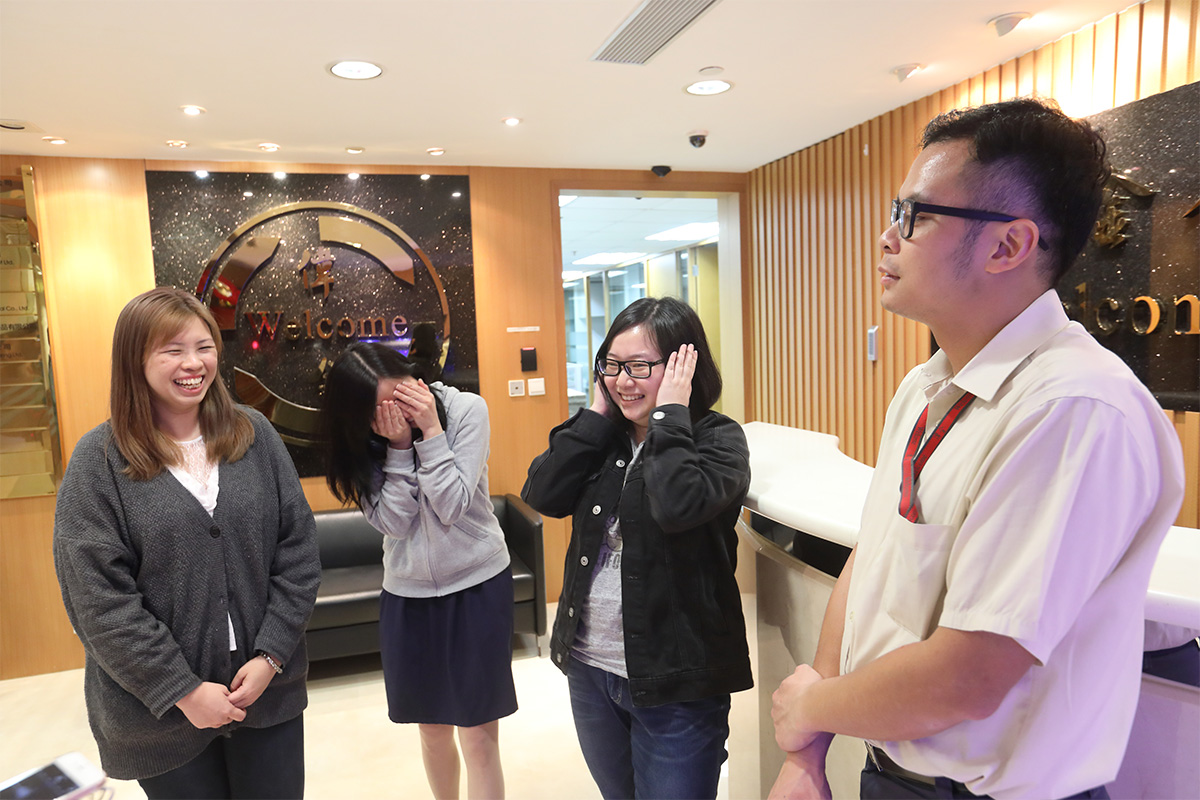 Welcome Construction does not only offer Wah-dee a job, but also an opportunity to connect with society, to make friends and to get a life.
Welcome Construction does not only offer Wah-dee a job, but also an opportunity to connect with society, to make friends and to get a life.
Over the last five and half years, they have become friends, or, more precisely, friends who would come to Wah-dee's rescue.
Jenny recalls, "One day, our colleague spotted Andy wandering in a lingerie outlet near our company. She immediately dragged him out to avoid any potential misunderstanding." She lectured him on social codes on the spot and informed their department head to call Wah-dee's mum, whom could seize the opportunity to lecture him at home.
The department head, Ivan Leung, who is Manager of the Accounting Department, says, "We keep Wah-dee's mum posted on any peculiar behaviours. One time, my colleague was enraged by a mistake Wah-dee had made. Before we talked to Wah-dee, I informed his mum of our approach and we assessed whether his emotional state could handle. "
For a while, Andy daydreamed a lot and kept checking his phone. With his mother's consent, Ivan helped Andy to focus back on work by holding onto his phone during office hours. Jenny grins, "I knew that he was deprived of sleep when he was quieter than usual. It was later revealed that his mum allowed him to have longer internet hours. I reminded Wah-dee to avoid staying up late and get enough rest before going to work."
It goes both ways. Sometimes Wah-dee can provide alternative insights too. When some colleagues spoke of buying Mark Six enthusiastically, Wah-dee chipped in, "What if the Jockey Club is a hoax?" Jenny still finds it amusing, "It took us a second before realising Wah-dee's witty satire!"
 This is Wah-dee's office. Social workers of Heep Hong Society's "Star Project Support Service for High-Functioning Autistic Youth" visit the company regularly to check on and support his assimilation in the workplace. The company makes an exception for Wah-dee to ensure more leisure time for him. While all other colleagues have to work on Saturdays, Andy works only five days a week.
This is Wah-dee's office. Social workers of Heep Hong Society's "Star Project Support Service for High-Functioning Autistic Youth" visit the company regularly to check on and support his assimilation in the workplace. The company makes an exception for Wah-dee to ensure more leisure time for him. While all other colleagues have to work on Saturdays, Andy works only five days a week.
Gone is the easily nervous, autistic boy and in comes the office's sweetheart Wah-dee. Jenny witnesses the power of acceptance, "Wah-dee is much more articulate and responsive now, sometimes rather sarcastic! He used to have problems with self-control and became irrelevant when he got excited. Now he can keep quiet upon request. I am sure he must have put in a lot of hard work."
As his colleagues joke, they cannot go on without Wah-dee in the office. "Clerical work is so tedious that it's hard to find someone for it." Jenny emphasises, "Wah-dee's work means a great deal. One time he was occupied with other tasks, so we needed to struggle with the photocopier by ourselves. We could not even switch on the machine and were finally left with no choice but to ask Wah-dee for help. He was obviously pleased, 'I have already cast a spell on this photocopier!'"
A question for Wah-dee would you like a job change if there is a more ideal offer?
Wah-dee answers assertively, "No, no more job change!" He says he will stay till the very end of the company.
Wah-dee is currently working in an office with only a few colleagues of the Accounting Department. The down-to-earth attitude and low turnover rate contribute significantly to a friendly workplace environment. However, another department will soon move over, making it more crowded. The change is expected to pose some new challenges to Wah-dee.
Jenny worries, "I am not sure if he can adapt to the change. I have already given the colleagues downstairs a heads up, not only on Wah-dee's condition, but also on their choice of words. It is best to avoid using expression like dumb or stupid. I jokingly called a colleague dummy one time and then Wah-dee kept on asking me 'who the dummy is' for more than ten times......he must be very sensitive to the word. In fact, we have no idea what he has gone through before. We can all get along well if we care to pay closer attention to each other."
 From Hong Kong to the States, the mother and son experience different attitudes in treating differences.
From Hong Kong to the States, the mother and son experience different attitudes in treating differences.
Her son, now fourteen years of age, has experienced way too many rejections. Jo Jo no longer feels anything to the phrase "Sorry Mrs. Ma but we really can't handle your son......"
Their first trial was the after-school gymnastics class at the kindergarten. In a tiny hall, there was only one coach and one trampoline for thirty four-year-old kids. Her son, in a brightly-coloured gymnastics leotard, jumped the long queue and took a leap...... The horror-stricken coach persuaded them to quit.
At the age of four, he joined a swimming class with three other students. The even more horrified coach said, "I asked him to wait by the poolside but he did not listen to my instructions. How dare he went for a swim by himself and then stood at poolside and peed to the pool!" Since then, he has never joined another swimming class.
At the age of nine, he joined a group of thirty students and two coaches at a soccer school. On a hot summer day, all other parents left their kids on the field and went for coffee. Only Jo Jo and her husband followed their son like hawks "Look at the ball!" "Stand firm and take a step with your left foot." "Turn around, son!" Jo Jo made fun of themselves, "Like two idiots......" Still, they hung on for a year before giving up.
All these explain her tears shed at the forest adventure ropes course in San Francisco. "That was the first time my son could participate in a group activity without my help. What an emotional moment!"
They had the idea of moving to the United States very early on.
Jo Jo was born in Hong Kong and studied in the States. She returned to Hong Kong after knowing her husband and gave up her architect career after the diagnosis of autism of her son. The family of three were met with obstacles at every turn. Although they managed to struggle through, she has been wondering all these years would her son have a better time if he were in the States?
"My sister in the States told me that her neighbour took her autistic child to school every day and my friend knew that her colleague had an autistic son. In Hong Kong, you may not even know about the autistic child of your old friend. I didn't know about the dyslexia of my friend's son until he was ten. Same for the hyperactivity disorder of my relative's son. We just sweep it under the rug but why? Because of shame? Or because of the discrimination that comes with the label? This is an issue of public education and a matter of policy-making. Many people in Hong Kong are still blinded by obnoxious ignorance and know nothing about SEN."
Jo Jo has been to California to observe classes in school and visit a government-funded family support centre.
"I talked to a staff member of the centre for an hour. He shared with me detailed information on the allowance for immigrant children of autistic disorder and the procedures of school admission and training. He also gave me his name card so that I could call back for enquires anytime."
It reminded her of the moment eight years ago when her son was diagnosed. Drained and perplexed, the couple could only hold onto the pile of A4 paper handed over from a social worker...... Compared to that, this time feels much more assuring.
During their frequent trips in recent years, her son takes to the United States like a duck takes to water. First because he speaks better English than Chinese, second because he can finally relax in an environment of bigger space and with people with bigger hearts.
"At a high-end restaurant in a touristic area, the male server of our table had long hair and countless pieces of nose rings and lip rings on his face. In the States, personal styles are respected and different people are accommodated.
Jo Jo had lived in the States for a decade and her son was only there to travel for a few weeks every trip. She is not so naive to regard the States as a paradise for SEN children, "No doubt discrimination and bully also exist there, but people are more willing to speak up, which can offer you a comforting feeling of 'you are not alone'. You can question back your teacher loudly when you have problems isn't it exactly what an autistic child would do? But I wouldn't do so in Hong Kong......"
As she recalls, her visit to a local school there happened to be on the information day for SEN students. Over twenty booths in the playground contributed to a comprehensive introduction to the housing, law, insurance and other support services. How could teachers ignore the needs of SEN children in such an environment?
They are still based in Hong Kong because their son does not want to be parted from his dad. Mr. Ma is a professor of a university in Hong Kong. Studying abroad will lead to separation of father and son, which makes the decision very difficult for the whole family.
Mr. Ma says, "Human development regardless of religion, race, sex has long been dominated by the mainstream society. From the stroke order of Chinese characters to the writing pad chair in classroom, most things in our society are designed for right-handed people. Absolute integration is almost impossible, particularly not in Hong Kong society where neoliberalism reigns. It is even harder under the rubric of efficiency and effectiveness. All we want is a relatively equal society. Our request is humble but Hong Kong still lags far behind. Hong Kong is not a liveable city for SEN families and probably not for non-SEN families either."
His son's diagnosis gave him a first-hand experience, "Always in the queue for resources and services, the waiting is never-ending. No money no talk. Less advantaged autistic patients are doomed in Hong Kong." Luckily, they have options, but many SEN families do not.
"That's why education is very important because knowledge is the first step. You have to acknowledge that there are various types of people living in the same community. Just as there are Buddhists and Muslims living in the mainstream society of white Catholics. Everyone needs to learn how to respect differences, at the very least."
To leave or not to leave? Mr. Ma now faces a dilemma many fathers have also experienced what is the best for my son? "We have, more or less, a mentality typical of Hong Kong parents. We hope that he can get into a university, pick a profession and live a middle-class life. Yet, children aren't really given an option throughout their education. Parents of SEN children are left with more struggles because you have to get involved in his life at a very early stage. You need to line up a lot of trainings and plan his future path ahead. But perhaps he is the happiest when he watches cartoons at home every day?"
For their son's future, Jo Jo's vote still goes to the States. "If you can't study well in the States, you can still learn about car maintenance or be a waste collector. The wage gap is not as wide as that in Hong Kong." More opportunities breed bigger hearts. A wider path is important to young people, particularly young people with SEN.
The SEN parents' group is flooded with messages soon after calling for the "Infuriate SEN parents with one sentence" submission. Parents of SEN children are no strangers to embarrassing accusations, malicious criticism, and even friendly but heedless attention. These words not only pain them, but also obstruct their daily lives.
We may not know how to respond when we meet hysteric SEN children in a park or school or on MTR. Let's listen to their parents how to help parents in predicament with one sentence?
The power of a helpful response is not to be underestimated, for it epitomises significant values and attitudes and tells a story of love and acceptance.

April, 2016
Some parents compare the diagnosis of SEN for their children to being thrusted a bomb unprepared no one can explain why or tell them how to go on. They can only hold onto the bomb with surreal calmness and keep waiting…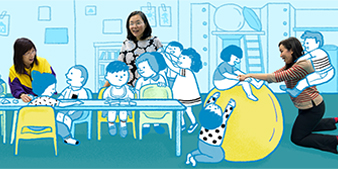
February, 2017
Growing up is an arduous adventure, but the journey is clouded by even more uncertainties after diagnosis of SEN new faces yet to be acquainted with, new titles that sound confusing more than clarifying…how is a special education preschool teacher different from a regular teacher? Why does the speech therapist keep playing toys with my child? What does a child need occupational therapist for? When should we consult an educational psychologist...?
December, 2016
"Mum, dad, have you noticed that your kid is slightly different from other children…"We have complied different kinds of social resources for your reference, including those provided or subvented by the government, non-subvented self-financing ones, as well as mutual/self-help efforts.
Details